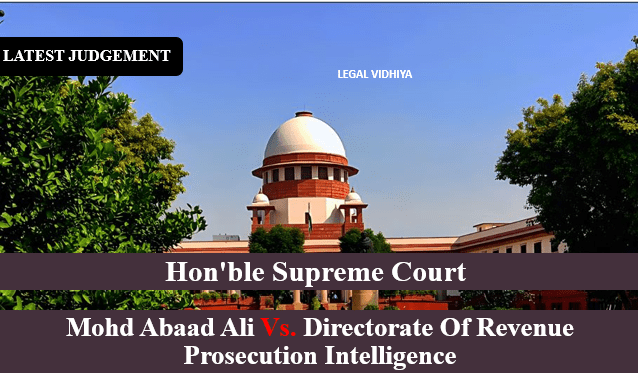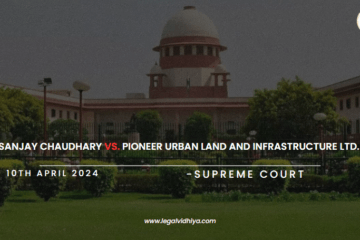
CITATION- 2024 INSC 125
DATE OF JUDGMENT- FEBRUARY 20, 2024.
COURT- THE SUPREME COURT OF INDIA
APPELLANT- MOHD ABAAD ALI & ANR.
RESPONDENT- DIRECTORATE OF REVENUE, PROSECUTION INTELLIGENCE
BENCH- SUDHANSHU DHULIA, PRASANNA BHALACHANDRA VARALE
INTRODUCTION
The case of Mohd Abaad Ali vs directorate of revenue involves an appeal against an acquittal under Section 378 of the Criminal Procedure Code (CrPC), where the Directorate of Revenue Intelligence appealed the acquittal of Mohd Abaad Ali & Anr under Section 135(1)(b) of the Customs Act, 1962. The main issue in the case of Mohd Abaad Ali vs. Directorate of Revenue Intelligence revolves around the question of whether the High Court had the authority to condone the delay in filing the appeal against the acquittal of Mohd Abaad Ali, given that the appeal was filed after the prescribed period under Section 378 of the Criminal Procedure Code (CrPC). The appellant argued that Section 5 of the Limitation Act, should not apply to appeals against acquittal under the Section 378 of the CrPC, It provides its own time frame for filing an appeal against acquittal, without any provision for condonation of delay.
The key issue was ‘whether the High Court had the power to disregard the delay in the filing of appeal against acquittal’, considering the absence of explicit provisions for such condonation within the framework of Section 378 of the CrPC.
FACTS OF THE CASE
- Mohd Abaad Ali, along with others, was one of the four accused in a case formulated under Section 135(1)(b) of the Customs Act, 1962.
- He faced trial in this case, where he was eventually acquitted by the Additional Sessions Judge, North, Delhi, under the order dated 06.10.2012.
- Furthermore, the Directorate of Revenue Intelligence filed an appeal against the acquittal on 27.06.2013, under Section 378 of the CrPC. This appeal was delayed by a span of 72 days, initiating the need for condonation of the delay.
- The Delhi High Court, on the date, 18.05.2016, allowed the delay condonation application, which permitted the appeal to proceed despite the delay.
- As a response, Mohd Abaad Ali initiated the filing of an application under Section 482 of the CrPC before the Delhi High Court, seeking to reconsider the order allowing the delay condonation.
- In his argument it was put forward that Section 5 of the Limitation Act, which allows for the extension of prescribed periods, should not apply to appeals against acquittal under Section 378 of the CrPC. The reason behind this is because, Section 378 provides its own time frame for filing an appeal against acquittal, without any provision for condonation of delay.
- Despite the application filed by Mohd Abaad Ali, the Delhi High Court, on 20.01.2017, dismissed the request for recall under Section 482, without providing any reasons for its decision.
- The appellant challenged this order before a higher court of authority, arguing that the High Court erred in allowing the belated appeal against acquittal, as Section 378 of the CrPC is self-contained regarding limitation, and there is no provision for condonation of delay. The central issue became ‘whether the High Court had the jurisdiction and authority to permit the appeal against acquittal’.
ISSUES RAISED
- Did the Delhi High Court have the authority to condone the delay in filing an appeal against acquittal in the case of Mohd Abaad Ali vs Directorate of Revenue Prosecution Intelligence, despite the absence of provisions for such condonation within the framework of Section 378 of the CrPC?
CONTENTIONS OF APPELLANT
- One of the main contentions on behalf of the appellant is the High Court lacked jurisdiction and authority to allow the appeal against acquittal. The contention was based on the absence of provisions within Section 378 of the Criminal Procedure Code for condoning delays in filing appeals against acquittal.
- Another prominent contention on behalf of the appellant is High Court violated the procedural framework established under Section 378 of the CrPC. The Section 378 of the CrPC sets forth specific time limits within which appeals against acquittals must be filed, and it may not provide provisions for condonation of delays beyond those specified time limits.
- Section 5 of the Limitation Act was invoked, which permits the extension of prescribed periods under certain circumstances. The essence of this argument was that Section 5 of the Limitation Act should not be applicable to appeals against acquittal under Section 378 of the Criminal Procedure Code. This was based on the premise that Section 378 establishes its own time frame for filing appeals against acquittal, without any provision for the condonation of delays.
- The appellant cited legal precedent; case of Kaushalya Rani v. Gopal Singh (1964) 4 SCR 982, to provide a better analysis and framework to support their argument.
CONTENTIONS OF RESPONDENT
- The respondent argued that the High Court had the authority to condone the delay in filing the appeal against acquittal. They inferred that the High Court possesses authority, as provided under Section 482 of the Criminal Procedure Code (CrPC), to ensure justice and equity in exceptional circumstances, which includes the condonation of delays.
- The respondent countered the appellant’s argument regarding the interpretation of Section 378 of the CrPC and its relationship with the Limitation Act. They contended that Section 378 outlines the general procedure for filing appeals against acquittal, it does not expressly preclude the application of Section 5 of the Limitation Act to such appeals. They even argued that the High Court was justified in considering the appeal and condoning the delay under the provisions of the Limitation Act.
JUDGEMENT
The Supreme Court held that the delay that occurred in preferring an appeal against the acquittal can be condoned under Section 5 of the Limitation Act, 1963. It was a Concurring judgement with the decision of the High Court. The Bench Comprising Justices Sudhanshu Dhulia and P.B. Varale observed that if there is a delay in filing an appeal against the acquittal of the accused then the delay can be condoned.
The case of Kaushalya Rani v. Gopal Singh, 1963 was referred while giving the judgment where, it was held that ‘Section 5 of the Limitation Act would not apply in an application for leave to appeal under sub-section 3 of Section 417 of the old CrPC before High Court, in as much as Section 417 is a special code in itself and the limitation prescribed therein is 60 days and the court has no power to relax such a limitation to condone the delay. When the Comparison between the old and new Limitation Act was held, the Court highlighted that in both the provision, the extension of time of limitation is highlighted in Section 5. Whereas, 1908 Act states that Section 5 will not apply when the period of limitation is given in special Acts, the 1963 Act makes Section 5 applicable even in the special laws when a period of limitation is given, unless it is expressly excluded by such special law. The Supreme Court dismissed the appeal filed by the appellant-accused. The Court held that the delay occurred in preferring an appeal against the acquittal can be condoned under Section 5 of the Limitation Act, 1963.
ANALYSIS
The case, Mohd Abaad Ali vs directorate of revenue prosecution intelligence revolves around the issues related to condonation of delay in filing an appeal against acquittal under Section 378 of the Criminal Procedure Code, where the Directorate of Revenue Intelligence filed an appeal against the acquittal of Mohd Abaad Ali & Anr under Section 135(1)(b) of the Customs Act, 1962. The case incurred various judicial considerations and relevant provisions of code of criminal procedure and limitation act. The precedents were also taken into consideration for the same. In this case, the appellant argued that the High Court erred in allowing the belated appeal against acquittal, contending that Section 378 of the CrPC provides its own time frame for filing appeals against acquittal without any provision for condonation of delay. The appellant invoked the interpretation of the Limitation Act, mentioned in Section 5, which allows for the extension of prescribed periods in certain circumstances, to support their argument.
CONCLUSION
This case initially prompted judicial consideration and interpretation of relevant provisions of the CrPC, including Section 378, and also the Limitation Act, to determine the scope and authority of the High Court in such matters. Ultimately, the court’s decision had a significant impact on the procedural framework governing appeals against acquittal and the extent to which courts can exercise their jurisdiction in condoning delays in filing such appeals. The Court observed that “The benefit of Section 5 read with Sections 2 and 3 of the Limitation Act, 1963 can therefore be availed in an appeal against acquittal. There is no force in the contentions raised by the appellants as regards the non-application of Section 5 of the Limitation Act in the present case and the appeal is therefore dismissed.”
REFERENCES
- https://www.dhyeyalaw.in/mohd-abaad-v-directorate-of-revenue#:~:text=The%20Supreme%20Court%20dismissed%20the,of%20the%20Limitation%20Act%2C%201963.
- https://www.livelaw.in/supreme-court/delay-occurred-in-filing-appeal-against-acquittal-under-s378-crpc-can-be-condoned-under-limitation-act-supreme-court-250088
- https://www.scconline.com/blog/post/2024/02/22/limitation-appeal-against-acquittal-can-be-condoned-supreme-court/
Written by Nyasa Tahim an intern under legal vidhiya.
Disclaimer: The materials provided herein are intended solely for informational purposes. Accessing or using the site or the materials does not establish an attorney-client relationship. The information presented on this site is not to be construed as legal or professional advice, and it should not be relied upon for such purposes or used as a substitute for advice from a licensed attorney in your state. Additionally, the viewpoint presented by the author is of a personal nature.






0 Comments